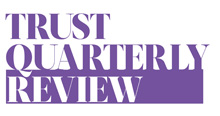Uncommon wealth
More difficult still is ‘trust law’. Thus, we are glad to be able to continue our coverage of jurisdictions that are not ‘common law’, have little close familiarity with trusts or have limited local ‘recognition’ of the trust concept.
Our first offering is the contribution of Jörgchristian Klette and Daniel Schüttpelz, who ask how the tax system in Germany, a nation that does not recognise trusts, treats trust-derived distributions to domestic taxpayers. Here, a sizeable grant from an external family foundation for what common lawyers would call ‘educational advancement’ was held to be outside the scope of the domestic gift tax in the hands of the beneficiary.
The outcome, although no doubt welcome to the recipient, is, for us advisors, significant since it shows a willingness to understand and fit trust-type structures and attributes into a ‘non-trust-recognising’ regime.
In a further article, Bénédicte Pigeon-Brügge TEP details a Swiss case of an executor demanding information, as to a New Zealand trust, from a Swiss company that had played a modest role in helping the deceased make the settlement. The Swiss advisor was held not liable to disclose what information it had, nor what advice it had tendered. Why the litigation took the form and advanced as far as it did is not self-evident, but the Federal Supreme Court of Switzerland’s ruling helpfully showed a comforting familiarity with trust practice. We await with interest the impending promulgation of a domestic Swiss trust law.
Our third piece highlights a ‘ground-breaking’ case in China. In 2001, China adopted a trust law. It has all the features of a framework provision and, until this case heard last year, does not seem to have received judicial attention. Here, a (rather muddled) will gave rise to problems of interpretation and implementation; these, coupled with inter-family dissent, brought the issues to court. With wisdom and pragmatism, the appellate court invoked the recent trust law to both uphold and make workable the inferred objectives of the testator. One hopes that this is the start of a flowering jurisprudence. We are grateful to Dr Hao Gao TEP and Jun Luo for contributing the article in this issue.
Freedom to make a will covering all one’s property and in favour of any legatee was for many years a questionably proud boast of common law. In England and Wales, its erosion started 45 years ago, giving to a limited category of family members rights not to ‘overturn’ the will but, if claiming within a short time window, to seek reasonable financial provision from the estate. The classes of permitted claimant have, over time, widened. Barrister Sidney Ross TEP’s study examines cases where out-of-time claimants have sought an extension of time in order to pursue a late claim. This analysis describes a single domestic litigation procedure, but the ostensibly narrow view opens out into a wider vista of the range of these issues and the spectrum of principle and outcome.
The book reviewed in this issue is, in spirit, founded on two recent UK Supreme Court cases, Braganza and Eclairs. However, these two have been seen in many ‘following’ jurisdictions to have widened the grounds on which courts may review, annul or replace ‘decisions’ made by decision-makers. The areas may be contract, company board, trust discretions and governmental. Pensions, Contracts and Trusts: Legal Issues in Decision Making is wider in scope than its title signals and we applaud David Pollard for his energy.
The Editorial Board hope all readers will join us in saluting the professional staff at STEP for cheerfully ‘keeping going’ in a pandemic. Well done.
The content displayed here is subject to our disclaimer. Read more


Connect with us